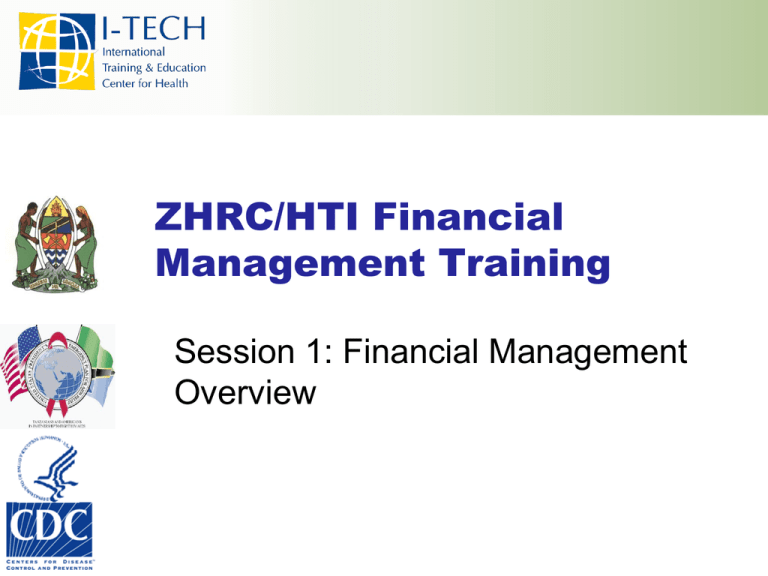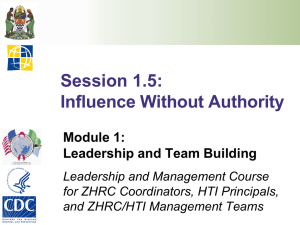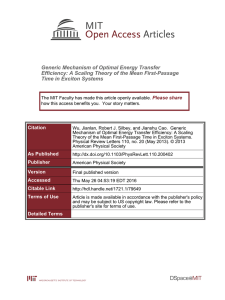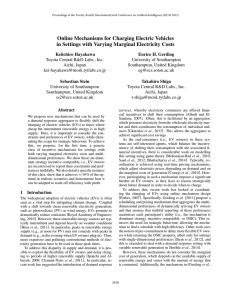What is financial management?
advertisement

ZHRC/HTI Financial Management Training Session 1: Financial Management Overview Learning Objectives (1) • By the end of the session, participants will be able to: • Define financial management • List challenges to strong financial management in the ZHRCs/HTIs • List the ‘7 Principles of Financial Management’ • List the ‘4 Building Blocks of Financial Management’ Learning Objectives (2) • Describe how to apply concepts of financial management to the ZHRCs/HTIs • Describe the central role of financial management in achieving an organizations objectives • Recognize that financial management is everyone’s responsibility What is financial management? Definition • Financial management is the process of planning, organizing, controlling and monitoring the financial resources of an organization to achieve its objectives • In the ZHRC/HTI context, financial management is comprised of processes and actions taken by administrative leaders and financial staff of the ZHRC/HTI Why is financial management important? Importance of Good Financial Management • Helps managers make effective and efficient use of resources to achieve objectives and fulfill commitments to stakeholders • Helps the organization achieve long-term financial sustainability • Helps the organization be more accountable to stakeholders and development partners Financial Management of an Organization is like Maintenance of a Car Functions of Financial Management • In Tanzanian Government entities, the functions of financial management include: • • • Maximizing the sustainability of service provision Making financing and investment decisions Managing liquidity and cash flow Tanzania Public Finance Act of 2001 • The principle Act governing the financial operations of all government institutions in Tanzania • Purpose of the Act is ‘to make provision for revenues, management of funds and resources of government authorities, and for other matters connected to securing proper collection and sound management of finances in local and central government systems’. Public Finance Act 2001 Outline (1) There are 7 parts to the Act: • Part I : Preliminary Provisions • Part II : Control and Management of Public Finance • Part III: Estimates of Revenue and Expenditure • Part IV: Preparation, Audit and Examination of Accounts Public Finance Act 2001 Outline (2) • Part V : Audit of Public Authorities and Other Bodies • Part VI: Finance and Audit of the Controller and Auditor-General and Related Provisions • Part VII: Other Provisions Elements of Financial Management • There are three broad elements of financial management: • Allocation of finances • Controlling resources • Financing decisions Methods Used to Achieve Financial Management Elements • Management methods, including contracting out service delivery • Accounting methods, including record keeping and financial reporting • Budget methods and processes like Medium Term Expenditure Framework (MTEF) • Financial analysis such as examining resource utilisations • Management Information Systems • Auditing Four Key Components of Financial Management (1) 1. Managing scarce resources • Matching available resources to the activities planned by the ZHRC/HTI • Monitoring the efficiency of resource use • Finding ways to finance new initiatives • Identifying methods to reduce and recover costs Four Key Components of Financial Management (2) 2. Managing Risk • All organizations face internal and external risks that can threaten operations • Risks must be identified and actively managed in an organized way to limit damage they can cause Four Key Components of Financial Management (3) 3. Managing Strategically • Financial management is part of management as a whole • Strategic management includes: • Identifying trends in past resource usage in order to determine future budget requirements, project cash needs, and forecast financial growth • Developing long-term financial plans to meet future resource requirements Four Key Components of Financial Management (4) 4. Managing by Objectives Plan Review Do Features of Good Financial Management Systems in the ZHRCs/HTIs (1) • Financial information is available to plan and control the use of resources • Clear objectives are set for planning and budgeting • Revenue/resources are mobilised • Officers are accountable for ensuring that expenditure and revenues comply with the regulations Features of Good Financial Management Systems in the ZHRCs/HTIs (2) • Relevance is clear between the achievements accomplished and the resources used • Strong systems, controls and audit processes • Guided by the Public Finance Act and Ministry of Health financial circulars and regulations • Public Procurement Act No. 21 of 2004, Standing Orders • All financial affairs should be subject to both internal and external audits Challenges to Strong Financial Management in the ZHRCs/HTIs • Insufficient funds and resources for planned activities • Staff turnover and delays in hiring to fill vacant positions • Limited opportunities for professional development and training for the ZHRC/HTI financial employees • Insufficient time available for thorough budgeting, planning and reviewing results 7 Principles of Financial Management • • • • • • • Consistency Accountability Transparency Viability Integrity Stewardship Accounting standards Work in Pairs: 7 Principles of Financial Management 4 Building Blocks of Financial Management (1) 1. Accounting Records • Accurate records of how funds have been used 2. Financial Planning • Budget 3. Financial Monitoring • Financial reports 4. Internal Controls • System of controls, checks, and balances 4 Building Blocks of Financial Management (2) Getting the Basics Right 4 Building Blocks of Financial Management (3) • All building blocks must be in place continuously • Effective financial management will not be achieved by partial implementation Work in Pairs: 4 Building Blocks of Financial Management Key Points (1) • Financial management is the process of planning, organizing, controlling and monitoring the financial resources of an organization to achieve its objectives • It is essential for an organization to meet its financial objectives • 4 key components of financial management are: • • • • Managing scarce resources Managing risk Managing strategically Managing by objectives: ‘Plan-Do-Review’ Key Points (2) • The 7 principles of financial management include: consistency, accountability, transparency, viability, integrity, stewardship and accounting standards • Use of these principles is good practice for building strong systems • The 4 building blocks of financial management include: accounting records, financial monitoring, financial planning and internal controls











